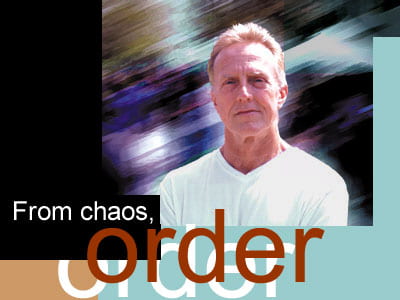From chaos, order
For economist Art De Vany, the natural order that emerges spontaneously from chaos is more efficient and responsive than anything a planner could devise

UCI economist Art De Vany confronts chaos cheerfully. He believes it is the source of creativity and true efficiency. He also believes there’s a lot more of it around than people are willing to admit.
Chaos theory isn’t easy to understand, and De Vany faces the added handicap of trying to explain it in economic terms. So he frequently uses this example: “A crowd can empty a football stadium in minutes, solving what is an intractable computational problem and exhibiting large-scale adaptive intelligence in the absence of central direction.”
Never far from a question, he goes on: “Why are decentralized processes ubiquitous throughout nature and society – evolution itself is such a process – and why do people remain so distrustful of them that they will sacrifice their autonomy and freedom for centralized solutions?”
Why do human beings, apparently, yearn to have somebody in charge? Why do they find it so easy to believe that somebody IS in charge – Alan Greenspan of the American economy, for instance. Is it human nature? Is it Western thought? De Vany doesn’t know but he theorizes, constantly.
A sample, verbatim: “The training of Western thought – the sort of top-down rationality, and the reductionism of modern science – has also been partly a factor in our belief that there’s a kind of root cause, that something is making the system go. But the farther we go down, the more we understand that there is no root cause, that everything is a booming, buzzing intermixture of signals coming from lots of different places, but somehow they get coordinated through a variety of schemes. A lot of our intelligence turns out to be in the world around us instead of inside us, because we interact with the physical constraints and the reality of the world that helps to shape this booming confusion.”
He knows the caroming from concept to concept is dizzying, and apologizes for it. “I digress so much. My thought is just as chaotic as my theory. It makes me a bit of a frustrating lecturer. I just see so many connections. I try not to follow them all.”
Will a natural order emerge? “I hope not! I’d stop having new ideas.”
De Vany thinks he’s probably an unusual economist because he refuses to make predictions. Error probabilities expand exponentially – .3 percent error in a month’s time can become 5,000 percent in five years – so how can anyone predict, he asks.
“I part company immediately with any economist who would agree to sit down and design a market. I don’t have that centralized mindset. I say, that’s absurd! Markets develop on their own. You can’t predict how they ought to be.”
On the other hand, he thinks, economics itself is changing. “The whole profession is starting to move out of the narrow neoclassical box we’ve been in.”
His research is supported by no sponsors, except for a small annual grant from the Private Enterprise Research Center at Texas A&M University, an organization De Vany identifies as a “libertarian think tank.” The money allows him to update his computers,” he says. Otherwise, “I don’t take grants. I don’t like working for the federal government.”
De Vany learns about systems anywhere, everywhere. Einstein physics jostles in his mind with temperature layering of ocean waves, patterns of healthy versus unhealthy heartbeats and the way ants communicate. A mathematical formula designed to help understand one kind of mass movement, he thinks, can illuminate others. Molecules are like people; movements of crowds are something like movements of the atmosphere – or might be.
“It’s the combination of where do things go, and what’s the process that gets them there,” he says. “There are mathematics involved in both.
“If you watch water in a sink when you pull the plug, it’s attracted down the drain, swirling in a pattern determined by the Coriolus effect, force sweeping water into a new state of being. The flow of audience reaction turns out to have a statistical distribution describing a similar pattern, with the same kind of turbulence.”
He became moderately famous three years ago when The New Yorker published a story on his ideas about chaos in the movie industry. Hits couldn’t be predicted, he said, and there are no formulas for figuring out what will succeed at the box office. “The Last Action Hero,” a sure thing with big star power, fell on its face; “Forrest Gump,” out of left field, was a blockbuster.
In the media buzz that followed, De Vany seemed a prophet with an odd answer: There is no answer. This is comforting?
“Well, you know what?” he says. “It’s better than what they’re doing now.”
If moviemakers could accept that they can’t plan or predict success, he says, “it would lead to a lot better moviemaking, because what they do now is follow these formulaic ideas. They say ‘Well, we need to have something for this demographic and something for that demographic’ – and there goes the story.”
Heavy publicity and mass booking of movie screens can buy about four weeks of business, De Vany says, and then “ant economics” takes over. Like ants, people exchange information one-to-one. If opinion is favorable, the movie develops “legs” and begins to grow; unfavorable, it dies. He believes studio bosses would do better to “bring the creative aspects – the characters and storyline – back to prominence.”
De Vany’s work tends to attract publicity. The New York Timescalls. A Canadian documentary-maker strung the halls with cables. People magazine came to talk to the professor about his latest project, a diet and physical-fitness regimen based on hunter-gatherer patterns that he calls “evolutionary fitness.” When his next paper on R-rated movies – the numbers prove Hollywood produces too many of them, he says – gets published, there will probably be more of the same.
“I’m glad to have my research put out there, but I’m a little worried about how it’s used,” De Vany says. “People use it for their own purposes.” The conservative Cato Institute has republished some of his work, and a friend recently told him Rush Limbaugh had mentioned his work.
Movie critic Michael Medved did an hour on his radio show on De Vany’s paper “Does Hollywood Make Too Many R-rated Movies? Risk, Stochastic Dominance, and the Illusion of Expectation.” De Vany had sent Medved a draft because Medved’s work was mentioned. The conclusion, as De Vany put it, was that “Hollywood does make too many trashy movies.”
“He spent the whole time saying, ‘See, I was right, and this professor proves I was right,’ ” De Vany says.
De Vany has loved movies all his life, so he found it natural to apply his economic theories to the business. “Where else do you see a new product released every week but in the movies?” he asks. “It’s been a laboratory for me to work on these models.”
But he has worked on many others subjects as well – deregulation of railroads, airlines, natural gas pipelines and the electric power grid, privatization of inland waterways and the telecommunications spectrum. All are systems that have moved in recent years from centralized control to a looser, free market approach. They have become more chaotic, and De Vany thinks that’s good.
The theme of his studies – the natural order that emerges spontaneously from chaos is more efficient and responsive than anything a central planner could devise – wasn’t obvious to him for years, De Vany said. It emerged, order from chaos, when “I was going for Step 6, full professor, and I had to look at my accumulated record of work. I could see how I was drawing on all these fields and the themes were the same.”
It led him to organize a multidisciplinary conference on decentralization, held in February 1999. A second conference was held at UCLA the following November. Both gave him more reasons to believe that healthy systems are inherently chaotic and that rigid order might be synonymous with rigor mortis.
The healthy heart, for instance, has a more random, unpredictable heartbeat, one that doesn’t fall – as De Vany insists most things don’t – on a bell-shaped curve showing some “typical” pattern. “The idea seems to be that a healthy person has many decentralized parts of the body contributing to controlling the heartbeat.
“When a people become unhealthy, they lose this complexity and adaptivity of the heartbeat, and you begin to see a periodic heartbeat. It’s a loss of complexity. Well! That’s exactly the difference between regulation and deregulation, between a well-functioning stock market and one that’s functioning poorly. All these controls have imposed a lack of diversity that doesn’t give you the adaptability you get from naturally organized systems.”
The Internet, so far, is a naturally organized system, De Vany says, and that’s why its growth has been so explosive. Electrical power deregulation in California isn’t working well, he thinks, because it hasn’t really been released from centralized control but merely given a set of new ones.
In testimony to the National Energy Board of Canada and the U.S. Federal Energy Regulatory Commission, De Vany urged true deregulation of natural gas pipelines. He feels the same thing needs to happen with the electric power grid.
“I was basically telling them, look, you guys have no business even fooling around with this. You don’t know what you’re doing. Most people don’t like to hear that message, but it’s based on research. I don’t just say, ‘this is dumb.’ I say ‘here is an institution that’s far more effective, and here are the inefficiencies of what you’ve put in place, and here’s how to fix it.’ It usually means relying more on markets and more timely information, instead of rate-filings that depend on information that’s two-years stale.”
De Vany thinks he’ll be moving on from movies and utilities deregulation into a new interest – physical fitness and diet. A former minor league professional baseball player, fitness has been important to him all his life; at 63, he boasts the health of a man in his 30s. He’s writing a book on his concepts about “evolutionary fitness,” prescribing randomness and variety in both diet and physical activity.
A diet book can be a sure moneymaker, especially when the media gets interested. But De Vany says that’s not why he doing it. You can’t predict success any more than you can predict any other kind of future, he believes, so you might as well just follow your interests, and do what you enjoy doing.
